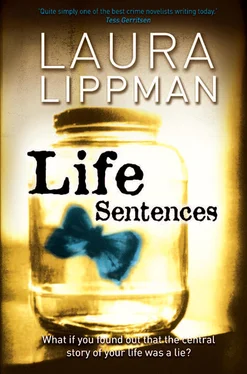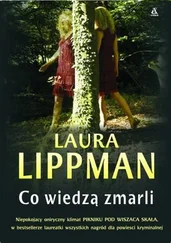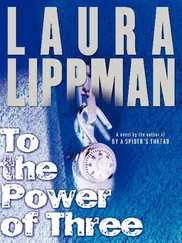But this conversation was already too fraught to take on the subject of the house, which her mother had come to love and defend against all comers. Instead, Cassandra asked her mother, ‘Do you remember Calliope?’
‘An organ? You mean at the Presbyterian church? And I think it’s pronounced differently, dear.’ Her father would have made the correction first.
‘No, in my class. Callie Jenkins. At Dickey Hill, starting in fourth grade. She’s in one of the photographs. She wore her hair in three fat braids, with those little pompon things on the ends.’
Cassandra bunched up a fistful of her own hair to jog her mother’s memory.
‘Three—oh, she must have been black.’
‘Mother.’
‘What? There’s nothing bigoted in saying that. Unless you’re me, I guess. I’m not allowed to notice the color of anyone’s skin.’
Cassandra had no desire to lecture her mother. Besides, she had a point.
‘At any rate, I was watching CNN and there was a story about this case in New Orleans—a woman’s child is missing and she took the Fifth, refused to say where the child is. Someone said it was similar to a case here years ago, involving Calliope Jenkins. It has to be the same person, don’t you think? The age is about right, and how many Calliope Jenkinses could there be in Baltimore?’
‘More than you might think.’
Cassandra couldn’t tell if her mother was being literal or trying to make some larger point about infanticide or her hometown. ‘Don’t you think that would make a good book?’
Her mother pondered. That was the precise word—she puckered her forehead and considered the question at hand as if she were Cassandra’s literary agent or editor, as if Cassandra could not go forward without her mother’s blessing.
‘True crime? That would be different for you.’
‘Not exactly true crime. I’d weave the story of what happened to Callie as an adult with our lives as children, our time in school together. Remember, she was one of the few girls who went to junior high with me.’
‘One of the few black girls,’ her mother said with a look that dared Cassandra to correct her for referencing Callie’s race.
‘Well, yes. And race is a small part of the story, I guess. But it’s really Callie’s story. If I can find her.’
‘Even if you do find her, can she speak to you? I remember the case—’
‘You do?’
‘Anyone who lived here at the time would remember.’ Was there an implicit rebuke in her mother’s words, a reminder that Cassandra had disappointed her by moving away? ‘I didn’t recognize her name, but I remember when it happened. The whole point was that she wouldn’t talk. But if she did kill her child, she can still be charged. If she didn’t, why didn’t she cooperate all those years ago?’
Cassandra was well aware of this particular problem; her editor had raised it first. They had agreed the book wouldn’t be dependent on a confession, or even answering all the questions, but the reader would need to believe that Cassandra had reached some kind of conclusion about her old school friend. Old school friend was the editor’s term, and while Cassandra had initially tried to correct the impression, using classmate and acquaintance , she soon gave up. What was a ‘friend’, after all, when you were ten or eleven? They had played together at school, gone to birthday parties together.
‘I can’t plan this book in advance. That’s what makes it exciting. With the first two books, they were already constructed, in a sense. I had lived them, I just didn’t know how I would write them. And they were very solitary enterprises. Solipsistic, even. But this time—I’m going to interview Callie, once I find her, but also other girls from the class. Tisha, Donna, Fatima. And Callie’s lawyer, I guess, and the police detective who investigated her…heavens, I’m not sure three months here will be enough.’
‘And, of course,’ her mother said, staring into her tea, ‘you’ll be here for all the hoo-haw surrounding your father.’
‘One event in a week of events,’ Cassandra said. ‘A simple onstage interview, and I’m doing it only because it will raise money for the Gordon School’s library building fund. We do owe the school a great debt. Besides, it will be interesting, interviewing Daddy in front of a captive audience. He’s the king of digressions.’
‘Yes,’ her mother said. ‘Your father loved digressing .’
‘It’s not a big deal,’ Cassandra said. She wished, as she often did, that they were a family comfortable with casual touches, that she could place her hand over her mother’s now.
‘I know,’ her mother said. ‘I just hate the way he…romanticizes what he did, to the point where he won’t even talk about it. Or her.’
Cassandra respected her mother for holding on to that ‘Or her’ for all these years, refusing to say Annie’s name unless forced. It might not be particularly healthy, but it was impressive. Cassandra shared her mother’s talent for grudges—it was, she liked to say in speeches, a useful quality for the memoirist, the ability to remember every slight, no matter how small. They called it their Hungarian streak, a reference to her mother’s mother, who had gone thirty years without speaking to her son and lived just long enough to see her granddaughter immortalize this fact in her first book. Nonnie hadn’t minded, not in the least. It had given her a little bit of cachet in the retirement center where she lived, largely indifferent to her neighbors. On what would prove to be Cassandra’s last visit with her, Nonnie had insisted on going to the dining hall, parading her successful granddaughter past the other residents: ‘My granddaughter, she’s a writer, a real one, a bestseller.’ Cassandra wasn’t sure if her grandmother had even read the book in which she took such pride; the volumes—only one book then, but Nonnie had purchased the hardcover and paperback—stood on a table in her apartment. They were, in fact, the only books in the apartment, perhaps the only books her grandmother had ever owned. Nonnie had been mystified, but proud, when her daughter had married a learned man, as she called him. And, true to her own unfathomable principles about loyalty, she continued to like Cedric Fallows even after he betrayed her daughter.
‘I’ve never understood,’ Cassandra said at that last lunch, ‘why you could forgive my father but not your own son. What did he do?’
Her grandmother waved the question away, as she had repeatedly while Cassandra was working on My Father’s Daughter . ‘Pfftt. I don’t talk to him and I don’t talk of him.’
‘Okay, but what Daddy did was pretty bad. Does that mean Uncle Leon did something even worse?’
‘Your father, Uncle Leon…who knows?’
‘Someone must know.’
‘It doesn’t matter. The book is good.’ Meaning: It sold a lot of copies. ‘It doesn’t have to be true. War and Peace isn’t true.’
‘My book is true, Nonnie. It’s a memoir, I made a point to get everything right.’
‘But you can only get things as right as people let you.’
‘Are you mad that I told the story about Uncle Leon and you? I asked your side.’
Nonnie pointed a fork at her. ‘I know how to be mad at people and if I were mad, you wouldn’t be here.’
A month later, she was dead. Cassandra was surprised to see her father at the funeral, more surprised that he had the tact not to bring Annie. He seldom went anywhere without her. Still, when the rabbi invited people up to share their thoughts, Cedric simply couldn’t resist getting up to say a few words, awkward as that was. Uncle Leon didn’t get up, nor did Cassandra’s mother, but the son-in-law who long ago ceased to be a son-in-law waxed eloquent about a woman he had never much liked.
Читать дальше












